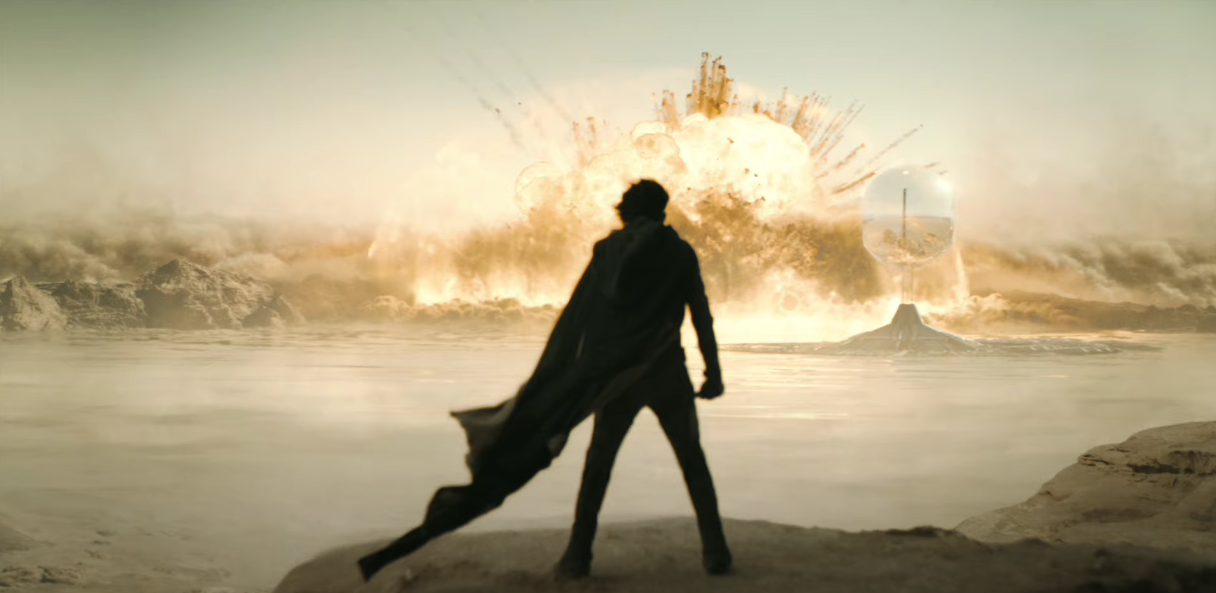Themes from “Dune Messiah” that may appear in Villeneuve’s third film in the series

Before Timothée Chalamet’s portrayal of Paul Atreides lies a challenging task – if anyone thought that in “Dune” House Atreides would become another positive superhero, fitting for a science fiction film, and merchandise would be sold alongside it in fan shops, they were mistaken. Messianism in Frank Herbert’s universe is morally ambiguous, which gives the adaptation of the “Dune” series a chance to create a brilliant series on the border between fantasy and sci-fi, such as hasn’t been seen in cinema for years. However, everything now depends on the transition between the books. After “Dune,” the next part of the saga is “Dune Messiah.” It’s a completely different part, much less adventurous and more metaphysical, reflective, and moralistic. Courtly, one might say, not to mention it’s filled with a love triangle. So how could Denis Villeneuve navigate through its somewhat conventional and intrigue-filled plot? In a sense, he’s already done it by concluding the second part of “Dune.”
It’s worth emphasizing from the start that “Dune Messiah” cannot be a straightforward adaptation because it won’t sell, and a large portion of the audience will grow weary of the plot. It must be a looser adaptation, so fans of Herbert’s prose should start getting accustomed to this idea to avoid later teeth gnashing on the internet. Probably it will still happen, due to the habit of grumbling about films based on literature, as well as the extensive possibilities for interpreting the book, which only fuel disputes – let’s call them cultural. The second book in the series allows for discussions and inspires them. Villeneuve will undoubtedly utilize this ideological platform to imbue his fantastical vision of society and space conquest into the film. As I mentioned, he began weaving his Dune universe according to his own vision at the end of the second part. However, he had to create the spatiotemporal conditions necessary for this, which would be impossible to transfer directly from the book to a full-length adaptation. In other words, time had to accelerate, and it had to do so significantly. This narrative model should now be maintained in “Dune Messiah.” Otherwise, this meticulously constructed world will suddenly start to collapse. The same will happen if another director takes over from Villeneuve.

So, since meeting the stern and highly anti-royalist Fremen, Paul Atreides has slowly built his position as the future Messiah and has been accepted by them as the Mahdi, he waited for about 5 years for his success to fully materialize. In the film, this period has been shortened to a few months. Some argue it’s a dozen or maybe 1.5 years, but personally, I’m inclined towards a maximum of 6, no more. Importantly, not a dozen, and this is primarily indicated by the fact that Paul’s sister, Alia, was born during his time with the Fremen – in the book. In the second part of the film, Anya Taylor-Joy appears as Alia, but this can’t be considered part of the normal plot involving Paul’s sister. She had an incredibly important role to play in the death of Vladimir Harkonnen, which didn’t happen. I don’t want to reveal that surprise here, although I’m already giving away the ending, so ultimately it shouldn’t matter. However, using Alia as an example makes it easy to explain the acceleration of the plot. Alia is not present. Instead of staying with Paul, bearing his children, and playing the role of a courtly martyr, Chani escapes into the desert with the worm. For the Messiah of Dune, such a plot arrangement is crucial, precisely for adapting this novel to the conditions of the third film, which is supposed to be watched rather than being a tedious philosophical treatise. In Herbert’s “Messiah,” Chani and Paul return to the desert, but for the Emperor’s concubine, this means death. Villeneuve has arranged these relationships differently in the second part of “Dune,” so I’m curious how he will deal with Chani’s earlier escape with the worm, if he intends to conclude “Dune Messiah” with Paul’s departure, already with the calm awareness that his children are alive – Chani gave birth to twins, Leto and Ghanima, after a traumatic and spice-accelerated pregnancy lasting only five months. If the director wanted to show the situation with Chani during the so-called courtly life, which Herbert devoted some text to, specifically the relationship between Chani and Irulan, and the latter’s attempts to kill Paul’s unborn children, Chani must return. For now, I can’t imagine any other scenario. Additionally, in this whole situation, I’m also interested in the subplot involving Scytale, a representative of an alien race in the universe (Tleilaxans), which never gave up on technological advancements, especially genetic ones, similar to the Ixians. This made them powerful and dangerous. There’s a tension-filled scene involving Scytale in the penultimate chapter (excluding the epilogue) of “Messiah.” Then there’s the surprisingly well-executed summary of the history by Duncan and Alia, and a very romantic ending.
“Messiah” is a much more modest novel than “Dune.” It has just over 250 pages, while “Dune” has over 620, not counting extras. So there’s more material, and Herbert presents it in a much more adventurous, broad, and action-packed manner. In “Messiah,” things are calmer. The plot focuses on creating plots from many sides to eliminate Paul. Who knows, maybe even the resurrected Duncan, as a ghola, was planning betrayal at some point, whether directly or indirectly. Speaking of which, the resurrected Duncan Idaho is a grateful material for a tragic hero, or even a competitor to Paul, considering the ending of the novel. Personality-wise, he is an interestingly delineated character because he feels like Duncan, yet also someone else, independent, liberated. It would certainly be a challenge to portray him in the film without becoming overly pretentious or high-flying. I say this because I miss in “Messiah” the portrayal of the 12-year war instigated by Paul Atreides. We only get a brief mention of it in this book, thanks to Bronso’s abbreviated report from Ix. I’m willing to bet that Villeneuve will expand the third part of “Dune” with an account of this concluding interplanetary conflict, in which over 60 billion people died.

But it wasn’t a typical conflict, it was a purely religious war. Anyone would be mistaken to think that after the first “Dune,” Paul Atreides evolved into someone better than Baron Vladimir Harkonnen or even Emperor Shaddam IV. The main reflection of Villeneuve’s film could perhaps focus on analyzing the meaning of such a war through the prism of Paul Atreides’ experiences, still living in the shadow of conspiracies at his court in Arrakis. He conquered the universe, spread the religion of the Fremen with fire and brimstone, yet couldn’t protect himself on his golden throne. Symbolically, he had to lose his sight to begin seeing through the eyes of others, including his newborn children. He also had to lose Chani and allow himself to be consumed by the melange desert, seeing it as the only punishment for the extermination of his species. In the name of what? In the name of protecting the spice business? Or of maintaining the sense of activity for the Bene Gesserit, for which he also became an outcast? Paul Atreides’ story is complicated, multifaceted, and the most challenging task still lies ahead for Villeneuve or any other director – how to guide Paul into exile without him becoming either another clichéd villain or a saccharine representation of his own superheroic visions. And the argument that he had to fight because otherwise he would lose control over spice extraction, and without it, the universe would sink into the uncontrolled side effects of withdrawal treatment, doesn’t convince me at all.
Now tell me, are complex love triangles a characteristic feature of the science fiction genre, as in the case of Irulan, Paul, and Chani? In “Dune Messiah,” we find many conversations between them, as well as reflections from the narrator, who weaves various doubts and scenarios in the viewer’s mind, describing reactions and doubts that this trio has while struggling on a highly refined emotional platform. It’s psychological drama and romance, not science fiction. So Denis Villeneuve faces a difficult task. And who are the distancers who got bored with the Tleilaxans? I see an interesting role here for Peter Dinklage.
So how did Denis Villeneuve navigate through the romantic courtly drama or the psychological drama of “Dune Messiah” and open the doors to a much more adventurous sequel? He made Chani an openly strong woman, whereas Frank Herbert hid her strength in passive actions as a child of his time.

